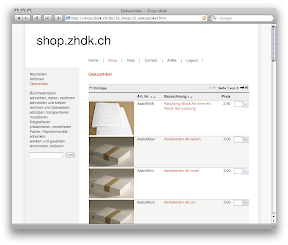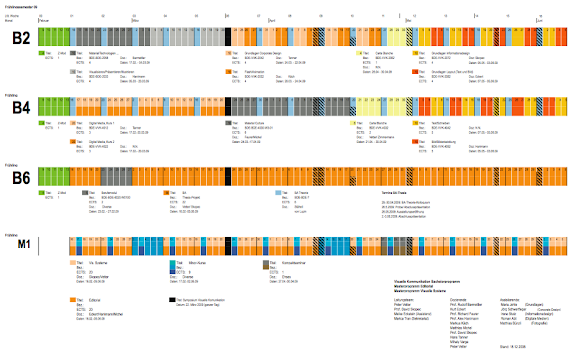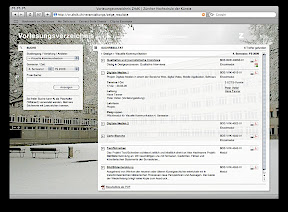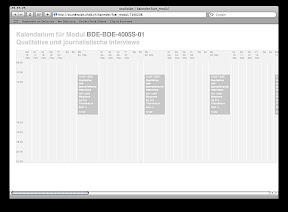Although it´s a five storey building with basement, they seem to suffer a constant lack of space. Apart from the vocational school there´s the department of design in this building with the specialisations industrial design, interaction and game design, scientific visualisation (their illustration course) and visual communication (that´s me) and also a lot of other art courses that I didn't really keep track of. UWE has that as well—lack of space. But that´s probably the only similarity in this respect. Apparently there are two computer labs but they're not open access. That´s the reason why I had to sign a bit of paper and confirm "to bring my own computer to use" because "without my computer I'll get no admission to study". Every student gets a studio space. That´s the traditional three-walled desk with a number of drawers and internet access. The 20 students actually seem to spend a lot of time in their studio. The walls are lined with type specimens, pictures, photocopies, large drawings of letters with typographic measurements written all over it. One student told me that these are the remains of a type design module last semester where they got instructed by an assistant of Adrian Frutiger (yes, the great swiss type designer of Univers and Avenir) in creating typefaces. I actually felt a bit embarrassed and uneducated when I looked around this 2nd year studio. Apart from the obvious (unfamiliar) typographic interest and knowledge pinned up on the walls, there are paper samples, lecture notes from their last HTML and CSS course, more lecture notes explaining professional print production, all indicators that their academic education during the last 3 semesters was a lot more relevant than mine and yet didn't lack creativity. Because of the studio space, the students seem to be constantly motivated. They come into uni and do the work, they discuss it while they're at it, they bond, they bounce ideas off each other and although that´s a corny phrase I think that´s what´s lacking in Bristol.
Coming back to the infrastructure and equipment of the place. I like UWE for their excellent workshops, even though I don't use them a lot. But I know where they are when I need them. At first it didn't seem like there´s any wood work, printing, laser cutting etc. here. But after asking around I found out that these centres do exist, but it´s not like everyone is using them all the time. It´s mainly industrial designers that make use of this machinery, everybody else just gets their stuff done there if they need it. The print facilities are in a different building apparently. I heard they offer very good letterpress courses (like actual courses, not just a workshop day) but they need to be booked separately.
 I always thought the art materials shop at UWE was a bit awkward. It´s basically a window where you buy paper and supplies over the counter. The supplies shop in Zurich is very different. It´s not a walk-in shop either—it´s an online shop! They have a range of over 3000 stationary products to order. You just pick it up at the university. And I thought the solution at UWE was awkward. But that´s not the only shop they have. The ITZ is the equivalent to the EPI centre. Not only do they provide the IT infrastructure, an IT helpdesk, workshops, various projects (e.g. a group for fans of open source software) and the production of websites and software—no, they also run a faculty Mac shop! It actually feels like the art materials shop at UWE just instead of somerset paper and faber castell pencils, with macbooks, mighty mice, wacom tablets and other mac related hard- and software to student prices on the shelves. Awesome!
I always thought the art materials shop at UWE was a bit awkward. It´s basically a window where you buy paper and supplies over the counter. The supplies shop in Zurich is very different. It´s not a walk-in shop either—it´s an online shop! They have a range of over 3000 stationary products to order. You just pick it up at the university. And I thought the solution at UWE was awkward. But that´s not the only shop they have. The ITZ is the equivalent to the EPI centre. Not only do they provide the IT infrastructure, an IT helpdesk, workshops, various projects (e.g. a group for fans of open source software) and the production of websites and software—no, they also run a faculty Mac shop! It actually feels like the art materials shop at UWE just instead of somerset paper and faber castell pencils, with macbooks, mighty mice, wacom tablets and other mac related hard- and software to student prices on the shelves. Awesome!Like at the media centre at UWE students can also hire various technical equipment here. Beside audio and video equipment, lighting, projectors, monitors, various players, tripods and all the usual stuff, you can also rent ibooks, iMacs, powerbooks and external hard drives. Furthermore there are bookable rooms like a video editing suite with 14 workstations, a sound recording studio and a photo studio including lighting and Nikon D200 camera. Actually very similar to UWE.
The library is completely different. Bower Ashton has 30,000 books and 190 periodicals. This one here has 3 million books and 1289 periodicals. A huge library? No, it´s tiny! The library is basically just a room with 30 study spaces, 15 of them with ethernet connection and 9 of them equipped with a Mac (note that there really are no PCs anywhere, not even in the library). The latest books and 184 periodicals are on display. So where´s the rest? The books are stored in the basement in some weird robotic storage system that automatically delivers a title to the library desk when it´s requested. The rest of the 3 million books are everywhere around the country. The libraries in Switzerland are all connected and within 24 hours you can have virtually any book you want. The downside is that you really need to know how to use a library catalogue and that you can't browse through the shelves. On the AV side, the library has 7000 DVDs, 1700 of them can be watched directly as a video stream. I think I'll miss browsing through the DVD shelves and discover weird documentaries that I can watch for my own entertainment though. Also the library keeps an archive of all final projects ever produced at this university and of all the exhibitions at the design museum. So there´s a nice catalogue of objects, prints, books, posters and packaging.
This list isn't complete without mentioning the organisational systems at this place. As we know, at UWE it´s simple: you get 2 modules per semester and you have to do them. In the 4th semester you get to choose one out of five and don't really need to worry or even think about anything. Here it´s different. I'd like to point out the semester timetable:
What a beautiful piece of information design (and it´s done in Excel by admin staff!). It´s just a complete mystery. There´s no way you could figure out what this means when you're not familiar with the whole system. But once you understand what you're doing, it´s actually useful.
There are theory Mondays, where we get to pick one out of 7 modules at 6 credits each. They are all lectures about politics and society and I guess it´s about the same as Visual Culture. Following the lecture on monday there´s a workshop on academic writing and a seminar about the issues raised in the lecture (all with a few credits as well). Then there is a 5 week module on Digital Media which is compulsory for everyone and earns you 6 credits as well. Following on from that is another module that we can pick out of 7 (different ones). This is an interdisciplinary and practical module with 6 credits again. After that follows a 2-week and 2-credit compulsory "carte blanche" module where details follow closer to the date. After that I picked an information design basics module with 5 credits and there´s a compulsory texting module with 5 credits as well. There were 2 study trips on offer, one to Lyon and Marseille and the other one to India, but I decided that Switzerland is enough culture shock for me this year. So overall I managed to get my required credits even though it took me a lot of running around and knocking on doors, getting wrong bookings cancelled and getting assistents of professors to explain everything to me in standard german.
It´s meant to be a simple module booking system. There´s a directory of all modules online on a fancy website that´s even changing the background image according to the time of the day and the year. It allows you to download the module description as a PDF file (not Word) and even subscribe to the events with iCal. What´s blackboard for UWE is evento for ZHdK. Here you can see all the modules you're enrolled to, print your own timetable and keep track of your credits. You can even download the contact details of your class mates (as .vcf files of course), if they allow it in their privacy options. Like at UWE, some lecturers don't seem to like using it, so it´s losing some of it´s effectivity. But it´s still a useful tool and works fine, as long as you don't attempt to delete a booking again. That´s what happened to me and it helped me to get to know a lot of members of staff.
Anyway, that´s my first impression of the place. It probably forgot to mention half of what I actually wanted to say. Some things are absolutely awesome, others make me miss the convenience I have in Bristol. Overall I have the feeling that this is a lot more professional. The standard seems a lot higher, which doesn't simply mean you just need to be 'better', no it´s more like you have to work harder, do more, do more relevant things rather than just pretty or nice stuff. Students here seem to know what they're doing, reflect on it very carefully and are highly motivated. Though that´s just my first impression and might change after a few weeks. So let´s see how I get on.



No comments:
Post a Comment